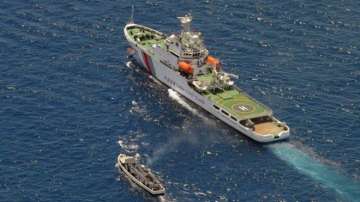Explained: All about the South China Sea dispute in 10 developments
The Hague, Netherlands: While the Philippines has welcomed the long-pending decision on the dispute over the South China Sea, it came as a major setback for the Chinese. An international tribunal today unanimously ruled that
The Hague, Netherlands: While the Philippines has welcomed the long-pending decision on the dispute over the South China Sea, it came as a major setback for the Chinese.
An international tribunal today unanimously ruled that there is no legal basis for China's "nine-dash line" claiming rights to much of the South China Sea.
Philippine Foreign Secretary Perfecto Yasay said, "The Philippines strongly affirms its respect for this milestone decision as an important contribution to ongoing efforts in addressing disputes in the South China Sea."
On the other hand, rejecting the judgement, Beijing, in a statement issued by the Ministry of Foreign Affairs, said that the award rendered by the Arbitral Tribunal in the South China Sea arbitration established at the “unilateral request of the Republic of the Philippines” is “null and void and has no binding force.”
To throw some light on this long-standing dispute, here's a guide to explain what all has happened in the case over the years:
1. This dispute over the control of the South China Sea is the most contentious and explosive diplomatic issue in east Asia. Other than China, the countries claiming maritime areas are Vietnam, Taiwan, Malaysia, Brunei, the Philippines and Japan.
2. Gradually, Washington also became a part of the dispute as it backed those who opposed China and conducted military patrols.
3. These countries have been asserting sovereignty over maritime areas that span 3.5m square kilometres because the South China Sea is said be a home to rich fishing stocks and a potential wealth of oil, gas and other resources and is a route for about $4.5tn (Rs 300 lakh crore approx) in trade. The 15 arbitration appeals of the Philippines can be divided into three categories - doubts about the nine-dashed line, questions about China's sovereignty over several islands, and the claims of China on its rights and interests in the South China Sea damaging the Philippines' interest.
4. The South China Sea arbitration was filed by the Philippines before the tribunal in The Hague in January 2013, contending China's massive territorial claims in the strategic waters don't conform with the 1982 UN Convention on the Law of the Sea and should be declared invalid. The Philippines took China to the Permanent Court of Arbitration (PCA) after the Chinese navy seized control of Scarborough Shoal, a largely submerged chain of reefs and rocks set amid rich fishing grounds off the main Philippine island of Luzon.
5. The United States has been leading international calls for China to respect the tribunal's decision, and the issue has become a key test of its ability to maintain its leading role in Asian security in the face of China's rising power. Beijing, on the other hand, has refused to participate in the arbitration process, and instead launched a global propaganda campaign to make its case. Foreign Minister Wang Yi was quoted as telling his counterpart John Kerry last week the process was a "farce," while his ministry says you have to be delusional to think China will bow to diplomatic pressure to accept the ruling.
6. China has signed the Declaration on the Code of Conduct (DOC) on the South China Sea with ten countries of the Association of Southeast Asian Nations (AESAN), including the Philippines, to better solve their disputes on the South China Sea.
7. China drafted its so-called nine-dash line to demarcate its claims to virtually the entire South China Sea. Manila brought the case because China's claims infringe upon its own 200-mile exclusive economic zone. The nine-dash line, a version of which first appeared on its maps in 1947, loops through the vast majority of the South China Sea, and Beijing uses it to claim sovereignty over almost all the islands, reefs and rocks in the South China Sea.
8. Favouring the Philippines, an international tribunal today ruled unanimously that there is no legal basis for China's "nine-dash line" claiming rights to much of the South China Sea.
9. The Philippines, which brought the arbitration case against China, welcomed the ruling. Philippine Foreign Secretary Perfecto Yasay called it a "milestone decision" and pledged to pursue a peaceful resolution of its territorial disputes with China.
10. On the other hand, China has rejected the jurisdiction of the panel that ruled that there is no legal basis for China's historic claims. Beijing says its sovereignty claims date back hundreds of years and are "indisputable."
